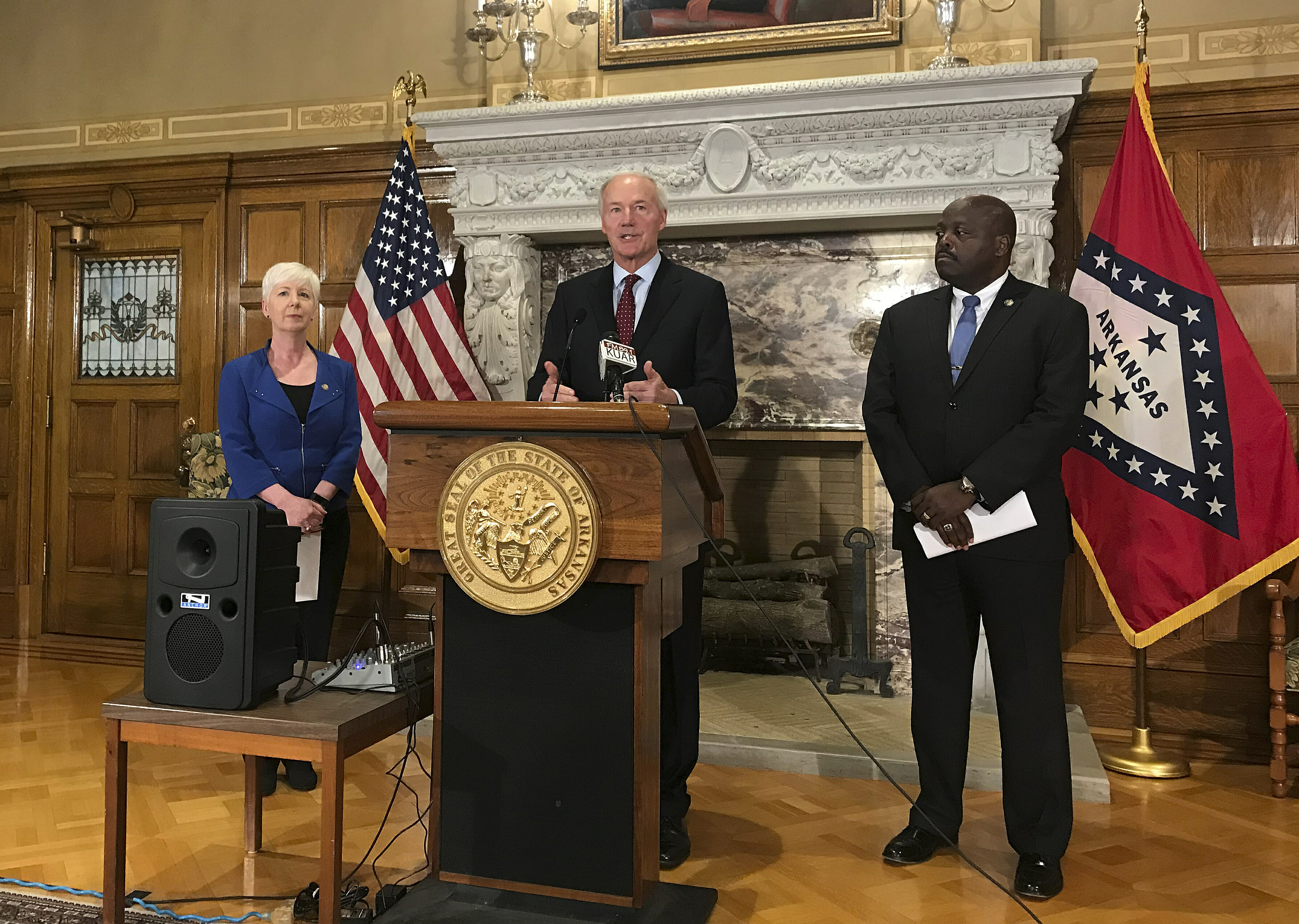
Ruling creates uncertainty for states' Medicaid work rules
LITTLE ROCK, Ark. (AP) — The governor whose state is at the center of the fight over work requirements for Medicaid recipients said Thursday he wants to fight a judge’s ruling blocking those rules, while Republicans elsewhere are trying to determine the decision’s effect on their state.
Arkansas Gov. Asa Hutchinson urged the federal government to appeal the ruling against his state’s requirement that certain people covered by its Medicaid expansion work or lose their coverage. A day earlier, a federal judge in Washington blocked work requirements in Arkansas and Kentucky.
Hutchinson said he wants the Legislature to maintain Arkansas’ Medicaid expansion program, which covers 235,000 low-income residents. The Republican governor said defunding it would mean giving up the fight over the work requirement.
“I remain fully committed to a work requirement, and we are in this for the long haul because we believe this is the right policy for Arkansans who want to work and need training and more opportunity,” the governor said during a news conference at the state Capitol.
Arkansas was the first state to enforce a Medicaid work requirement. Similar rules are in effect in Indiana and New Hampshire.
Arizona, Kentucky, Michigan, Ohio and Wisconsin have had their work requirements approved by the federal government, but they are not yet implemented. Several other states have requests pending with the Trump administration.
Expanding Medicaid to cover more low-income adults was a key pillar of former President Barack Obama’s health care reforms. It’s responsible for adding some 12 million people to the Medicaid rolls in the 37 states that accepted the expansion.
Many Republicans have argued for work requirements and other provisions, such as modest premiums, as a condition for agreeing to it.
In Kentucky, Republican Gov. Matt Bevin has threatened to end his state’s Medicaid expansion if work requirements are ultimately struck down. It was adopted under his Democratic predecessor and provides coverage for 400,000 people.
Bevin said Medicaid was intended to provide health coverage for the medically frail, the elderly and the disabled, and is skeptical of offering it with no strings attached to able-bodied, working-age adults who have no dependents. Under the rules in Kentucky and Arkansas, recipients also can fulfill the requirements if they volunteer or continue their education.
“The day of the free lunch is over,” Bevin said.
Indiana officials said they planned to move forward with their work requirements despite the ruling. Beneficiaries there won’t have to begin reporting hours worked until July, and next January is the earliest that any recipient could have coverage suspended for not complying. New Hampshire’s requirement, which took effect this month, also is being challenged in court.
A spokesman for Republican Gov. Mike DeWine in Ohio said his administration was reviewing the ruling to see if it would have any effect on that state’s requirement, which is expected to take effect in 2021.
DeWine has described the Ohio rules as a possible model for other states. He said they strike a balance between ensuring health coverage while creating a way for recipients to find a job.
The ruling does not affect Arizona’s planning to implement work requirements, said Heidi Capriotti, a spokeswoman for the Arizona Health Care Cost Containment System, the state Medicaid agency. Arizona’s work requirements are scheduled to begin no sooner than next January, she said.
The future is less certain in Michigan, where Democratic Gov. Gretchen Whitmer last month said she would ask the Republican-led Legislature to change newly enacted work or job-related requirements to qualify for Michigan’s Medicaid expansion program. They are set to take effect next year.
In Arkansas, failure to comply with the work requirement led to more than 18,000 people losing coverage last year. Those kicked off the rolls were able to re-enroll beginning in January, and Hutchinson said about 2,000 of them had done so.
Only recipients who gained coverage through the expansion — and not the regular Medicaid population — were subject to the requirement. They had to work 80 hours a month and lost coverage if they failed to comply three months in a calendar year.
State Department of Human Services officials said Thursday they were taking down the website used for reporting hours worked and planned to notify people that the requirement had been halted.
Critics of the requirement said Hutchinson should drop his support for it and instead focus on restoring coverage to the thousands who were kicked off.
“It was a bad idea, an even worse implementation, and it shouldn’t take federal courts to show us that we need to do better,” State Democratic Party Chairman Michael John Gray said in a statement.
The future of Arkansas’ expansion following the ruling faces a test on Friday, when the state House takes up the budget bill for Medicaid and the expansion.
___
Associated Press writers Rick Callahan in Indianapolis, Jonathan J. Cooper in Phoenix, Bruce Schreiner in Brandenburg, Kentucky, and Julie Carr Smyth in Columbus, Ohio, and contributed to this report.
___
Follow Andrew DeMillo on Twitter at www.twitter.com/ademillo
The Western Journal has not reviewed this Associated Press story prior to publication. Therefore, it may contain editorial bias or may in some other way not meet our normal editorial standards. It is provided to our readers as a service from The Western Journal.
Truth and Accuracy
We are committed to truth and accuracy in all of our journalism. Read our editorial standards.
Advertise with The Western Journal and reach millions of highly engaged readers, while supporting our work. Advertise Today.












